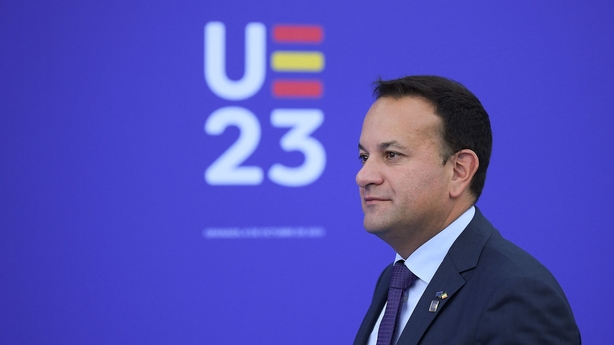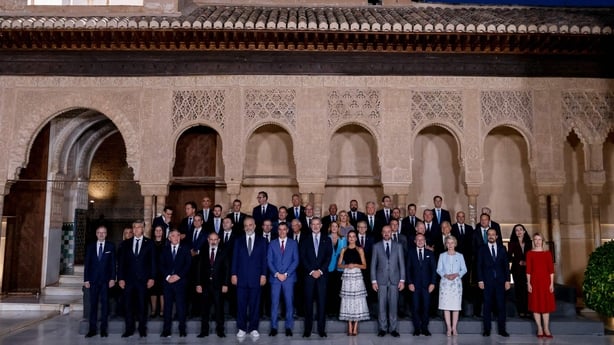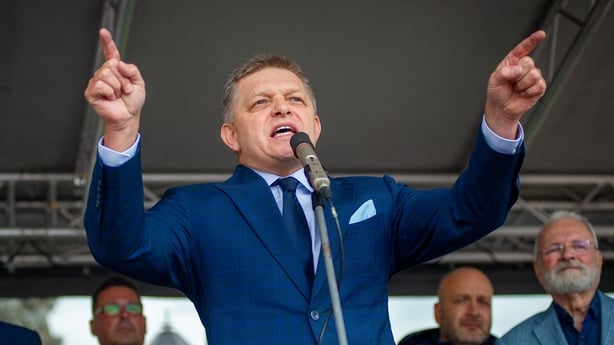A furious row over planned changes to Europe's migration rules has overshadowed an EU summit, although supporters of the reform have vowed opposition from Poland and Hungary would not derail it.
The Polish and Hungarian leaders did prevent the leaders from including migration in a joint statement of the summit's conclusions, forcing the meeting to end on a sour note of division.
But European Council president Charles Michel issued a separate statement about asylum policy and border protection in his own name, and the French and German leaders said the legislative process would continue as planned.
"The most important thing is what our interior ministers achieved a few weeks ago with the agreement on crisis regulation, because that is what is really relevant in political terms," said Spain's Prime Minister Pedro Sanchez, who hosted the summit, dismissing concerns about the clash.
But the gathering in the southern city of Granada did hand Polish Prime Minister Mateusz Morawiecki - who is facing a general election this weekend - and Hungary's Viktor Orban a stage on which to brandish their populist credentials for their domestic audiences.
"I officially REJECT the entire paragraph of the summit conclusions regarding migration," Mr Morawiecki posted on social media as the summit came to an end.
Earlier, Mr Orban courted outrage by comparing the EU's "forcing through" of migration legislation - which was approved by a majority of member states - to Hungary being "legally raped".
France's President Emmanuel Macron said that although their opposition had blocked any mention of migration in the final declaration, it would have no effect on the proposed bill, which was approved in outline by member states on Wednesday.
Member states, he added, had agreed to strengthen "joint action regarding transit countries and countries of origin".

Taoiseach rejects EU call to tie corporate profits to member state's contributions
Also at the summit, Taoiseach Leo Varadkar said Ireland is strongly opposed to any attempts to link corporate profits to a member state's contribution to the EU budget.
Countries were examining a European Commission proposal to seek new revenue streams for the EU budget, under pressure from the costs of the Covid pandemic and Russia's invasion of Ukraine.
One proposal is that member states would pay 0.5% of the annual gross operating surplus (GOS) of their corporate sector.
The GOS refers to the level of corporate profits once salaries, production costs and overheads have been stripped out.
Ireland’s GOS stood at €300 billion in 2021, largely due to the size of the multinational sector.
The Government has argued that the GOS metric would be grossly disproportionate to Ireland.
Figures supplied to RTÉ News by the European Court of Auditors show that Ireland’s GOS is almost 80% of gross national income (GNI), the measurement on which a member state’s national contribution to the EU budget is based.
The average EU GOS to GNI ratio is around 23%, while in France the percentage is 18%.
Under the Commission proposal, which requires the unanimous support of member states, Ireland would therefore be required to pay a disproportionately high contribution to the EU budget.

Speaking to reporters ahead of the summit, Mr Varadkar said: "We'd be very much opposed to any new measure in relation to corporate profits.
"We've already just signed up to an EU and international agreement to raise our corporation profit tax to 15%.
"I really, really would be very much against any attempt now to bring in another new corporate tax measure on top of that. It wouldn't be in Ireland's interests and really it isn’t what we thought we signed up to.
"We signed up to an agreement to have a minimum rate of tax of 15%, we're going to increase our tax to that in the new year.
"We also agreed to a new system of calculating where the tax base lies and we'd be very much against any attempt to add another corporate tax on top of that. It certainly wouldn’t be in Ireland’s interest."
EU leaders are meeting in Granada to discuss the EU’s strategic goals for the next five years, including how to expand the EU budget.
The EU begins paying back hundreds of billions in loans raised to pay for the post-Covid economic recovery in 2028, adding pressure to the existing budget.

New Slovak prime minister
Mr Varadkar has said he hoped there would not be a "double standard" at European political level over the place of the presumed new Slovak prime minister Robert Fico in the mainstream centre left political family.
The Smer party is a member of the Party of European Socialists (PES) at EU level.
Mr Fico has frequently praised Russian president Vladimir Putin and has pledged to end all weapons sales to Ukraine if he becomes prime minister.
Asked if Mr Fico's party should be removed from the PES, in the same way that the European People’s Party (EPP) came under pressure to expel Viktor Orban’s Fidesz party from Hungary, Mr Varadkar said: "I'm not gonna tell [the PES] what to do.
"He isn’t the new prime minister of Slovakia yet, so let's see what happens in terms of government formation in Slovakia. That ultimately is going to be a matter for the party of European socialists.
"I think it will depend on how he performs as prime minister if he becomes prime minister.
"That's really going to be a matter for them, but I just hope there won't be a double standard in terms of what they would have said about [the EPP]."
Fine Gael is a member of the EPP.
In March 2021, Fidesz left the EPP after a move by the bloc’s members to have the party expelled over Viktor Orban’s increasingly authoritarian tendencies in Hungary.
Read more: Who is Slovakia's incoming prime minister Robert Fico threatening Ukraine solidarity?

